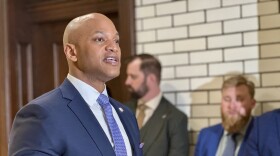Maryland lawmakers have spent the bulk of this year’s legislative session grappling with how to fill a roughly $3 billion budget deficit. On Thursday, Gov. Wes Moore and state legislative leaders announced that they have reached a long-awaited agreement on a budget that makes about $2.3 billion in cuts and includes more than $1.6 billion in new taxes.
Moore said the cuts represent the largest amount cut from the Maryland budget in 16 years.
“At its core, this budget aims to create a fairer tax system while ensuring that essential services like education, public safety, health care and infrastructure remain funded,” said Senate President Bill Ferguson, a Baltimore Democrat.
The agreement includes a new 3% tax on information technology and data services. It will apply to cloud storage, web hosting, some software and IT contractors, among others, and is expected to bring in nearly $500 million in its first year.
House Speaker Adrienne Jones, a Democrat representing part of Baltimore County, said this new tax is similar to policies already in place in Texas, Ohio and Washington, D.C.
The plan also creates two new tax brackets. Income between $500,000 and $1 million will be taxed at 6.25%, while income over $1 million will be taxed at 6.5%. Currently, Maryland taxes all income above $250,000 at 5.75%.
Officials say 6% of Maryland taxpayers are likely to pay higher income taxes, while 59% of state taxpayers will see lower income taxes as a result of a proposed increase in the standard deduction. The remaining 35% should see no change.
Lawmakers also plan to raise the capital gains tax on income above $350,000; increase the cannabis tax to 12%; and increase taxes on sports betting from 15% to 20%.
During their press conference Thursday, Ferguson emphasized what the budget plan does not do.
“We are not increasing the Maryland sales tax rate on goods. We are not adding a fee for deliveries. We are not increasing property taxes. We are not raising money from i-gaming. We are not increasing the estate tax. We are not making changes to the car trade-in allowance. We are not imposing any new taxes on sugary drinks or snacks. We are not raising the gas tax,” Ferguson said.
The plan maintains funding for state employee salaries, cancer research, crime victims and the Developmental Disabilities Administration, Jones highlighted. Moore’s original budget proposal targeted the DDA for hundreds of millions of dollars in cuts.
Moore said Thursday that the goal has always been to protect Marylanders.
“We were not going to put the pressure — the additional financial pressure on middle class families,” he said. “That was something that became very important to us as we were working through it.”
Republican leaders criticized the majority party for not looking for cuts in the Blueprint for Maryland’s Future, the state’s sweeping education system reform plan, as well as the plan for the new tax on data and IT services.
“Here we are trying to grow an industry to provide economic opportunity for folks in our state, to provide jobs, and we're going to tax the hell out of it,” Del. Jesse Pippy, the number-two Republican in the House, said, referencing Moore’s plan to boost technology industry growth in Maryland. “It just doesn't make sense.”
The Maryland Chamber of Commerce echoed those concerns.
“The effects of this proposed tax extend far beyond the tech industry,” the group wrote in a statement. “In today’s interconnected economy, tech services are a fundamental infrastructure component for businesses across all sectors.”
Republicans on the House Appropriations Committee also raised concerns that the higher income taxes on top earners will encourage them to leave the state. They voted against every proposed tax increase in the budget during the committee’s meeting Thursday afternoon.
But even without Republican support, the House Appropriations Committee passed its version of the budget Thursday. The full House is expected to take it up Monday. Meanwhile, the Senate plans to start work on its version of the budget next week.










